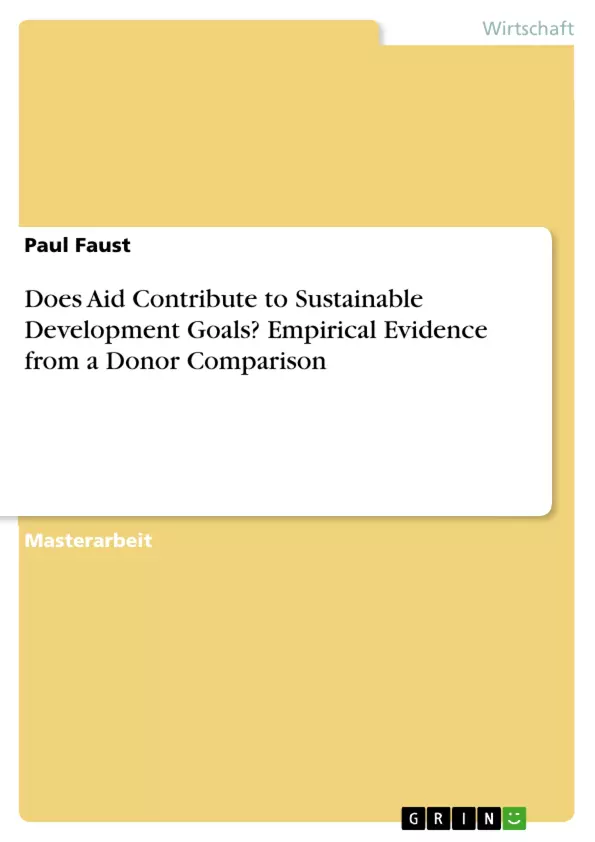“No Poverty, Zero Hunger, Good Health, Well-being and Quality Education - these are the first priorities of the Sustainable Development Goals (SDGs) that were launched jointly by all UN Member States on 1 January 2016.” The agenda of this agreement contains 17 main goals with a total of 169 targets and is dedicated to improving global living conditions and to address issues of environmental and economical sustainability with a planning horizon through to 2030. Development assistance from economically advanced countries, also referred to as aid, is one of the major means to provide financing for countries with less developed economies that face severe social problems, and which often cannot handle these problems alone.
Previous studies have shown, however, that aid is ineffective and recommend comprehensive restructuring of the common aid practices. Investigations that analyse the pattern of aid flows find, moreover, that granting aid to certain recipient countries cannot only be explained be altruistic motives. They show that several strategic or non-strategic reasons have a high explanatory power for individual donor aid allocation.
Against this background, the present master thesis explores aid effectiveness of distinct bilateral donors. This is achieved by a large-scale panel data analysis applying per-capita economic growth, infant mortality and primary growth as indicators for measuring the contribution of aid to achieving the different SDGs.
The study confirms previous findings that aid is widely ineffective. However, it also shows that aid effectiveness varies considerably between different bilateral donors. Whereas aid from one group of Nordic donor countries proves to correlate significantly positive with growth over various different methods, this cannot be determined for another group consisting of five major industrialised countries.
Inhaltsverzeichnis
- Introduction
- The Debate on Aid Effectiveness
- The aid-growth literature
- Looking beyond the effect of growth
- Evidence from donor investigations
- The aid allocation literature: Deriving donor interests
- Determining donor differences
- Research objectives
- Preliminary Empirical Analyses
- Data sources and definitions
- Disaggregating aid – descriptive statistics
- A first approximation: Cross-Country Evidence
- The effect on growth
- The effect on social indicators
- Post-Cold War changes
- Insights from a Dynamic Panel Data Model
- Reinvestigating the effect on growth
- Reinvestigating the effect on social indicators
- Robustness tests
- Policy Implications
Zielsetzung und Themenschwerpunkte
Die Masterarbeit untersucht den Beitrag von Entwicklungshilfe zur Erreichung der Ziele nachhaltiger Entwicklung. Mithilfe empirischer Daten aus einem Vergleich verschiedener Geberländer analysiert sie, ob und wie Entwicklungshilfe sich auf das Wirtschaftswachstum und soziale Indikatoren auswirkt.
- Die Auswirkungen von Entwicklungshilfe auf Wirtschaftswachstum und soziale Indikatoren.
- Die unterschiedlichen Interessen und Strategien von Geberländern.
- Die Rolle von Entwicklungshilfe im Kontext der nachhaltigen Entwicklung.
- Die Effektivität von Entwicklungshilfe im Vergleich zu anderen Entwicklungsfaktoren.
- Die Bedeutung von Datenqualität und -verfügbarkeit für die Bewertung der Effektivität von Entwicklungshilfe.
Zusammenfassung der Kapitel
- Das erste Kapitel stellt die Forschungsfrage und den theoretischen Rahmen der Arbeit vor.
- Das zweite Kapitel beleuchtet die Debatte um die Effektivität von Entwicklungshilfe und analysiert verschiedene Ansätze zur Bewertung dieser Effektivität.
- Das dritte Kapitel stellt die Forschungsziele der Arbeit dar und beschreibt die Forschungsmethodik.
- Das vierte Kapitel befasst sich mit den Datenquellen und -definitionen, die für die empirische Analyse verwendet werden.
- Das fünfte Kapitel präsentiert erste Ergebnisse aus einer länderübergreifenden Analyse, die die Auswirkungen von Entwicklungshilfe auf Wirtschaftswachstum und soziale Indikatoren untersucht.
- Das sechste Kapitel untersucht die Auswirkungen von Entwicklungshilfe mithilfe eines dynamischen Panel-Datenmodells, um die Effektivität von Entwicklungshilfe im Zeitverlauf zu analysieren.
Schlüsselwörter
Entwicklungshilfe, nachhaltige Entwicklung, Wirtschaftswachstum, soziale Indikatoren, Geberländer, Aid Effectiveness, empirische Analyse, Panel-Datenanalyse, Millennium Development Goals (MDGs), Sustainable Development Goals (SDGs).
Häufig gestellte Fragen
Trägt Entwicklungshilfe wirklich zum Wirtschaftswachstum bei?
Die Studie zeigt, dass Hilfe oft ineffektiv ist, aber die Wirkung stark vom Geberland abhängt. Hilfe nordischer Länder korreliert eher positiv mit Wachstum als die der G5-Staaten.
Was sind die Sustainable Development Goals (SDGs)?
Die SDGs sind 17 globale Ziele der UN (z.B. keine Armut, Gesundheit), die bis 2030 weltweit die Lebensbedingungen und Nachhaltigkeit verbessern sollen.
Wie wird die Effektivität von Hilfe gemessen?
In dieser Masterarbeit dienen das Pro-Kopf-Wirtschaftswachstum, die Kindersterblichkeit und das Primärschulwachstum als zentrale Indikatoren.
Welche Rolle spielen strategische Motive der Geberländer?
Untersuchungen zeigen, dass Hilfe oft nicht nur altruistisch gewährt wird, sondern auch durch strategische Eigeninteressen der Industrienationen motiviert ist.
Was ist der Unterschied zwischen bilateralen Gebern?
Die Analyse belegt signifikante Unterschiede: Während einige Länder effektive Hilfe leisten, zeigen andere Gruppen kaum messbare positive Effekte auf die Zielvariablen.
- Citation du texte
- Paul Faust (Auteur), 2017, Does Aid Contribute to Sustainable Development Goals? Empirical Evidence from a Donor Comparison, Munich, GRIN Verlag, https://www.grin.com/document/380646



